The post How School Leaders Manage Follow-up on Parent Sentiment and Questions appeared first on Possip.
Possip uses pulse check surveys and experienced educators to help schools make parents one of their greatest assets. We give parents weekly pulse checks that translate into weekly actionable reports for schools.
Thursday, 18 July 2024
Supporting Mental Health: Understanding and Coping With Grief
The American Psychological Association states that “grief is the anguish experienced after a significant loss, usually the death of a beloved person. Grief may also take the form of regret for something lost, remorse for something done, or sorrow for a mishap to oneself.”
Elizabeth Janca, experienced school administrator, Licensed Professional Counselor, and Possip Reporter shares different types of grief, the stages, and ways to cope with or mourn loss.
We often think of grief as a result of death, but it’s important to realize it can be the loss of a friendship, removing someone from your life, or regretting actions. Some important things to remember are that it looks different for everyone, there is not a set amount of time to experience it, and moving on doesn’t mean forgetting.
The Grieving Process
Experiencing grief is natural and what is considered “normal” varies based on culture, people, and situations. While it does look different for everyone, we can generally identify if someone is experiencing acute, complicated, or integrated grief. Firstly, become aware of different types of grieving:
Acute Grief
- Immediately follows the loss
- May experience shock, distress, sadness
- Feelings may impact sleep, appetite, and anxiety
- Symptoms slowly diminish over time
Complicated Grief
- The symptoms and feelings of acute grief never go away
- The loss continues to feel unreal
- May be accompanied by guilt over the idea of “moving on”
Integrated Grief
- Symptoms of acute or complicated grief have been resolved
- You have accepted the loss and have returned to daily activities
- Moving on doesn’t mean forgetting, you may not miss them any less
- You’ve learned to cope with the hurt that comes with their memory
- Acute grief may reappear during holidays, anniversaries, or other important events

The post Supporting Mental Health: Understanding and Coping With Grief appeared first on Possip.
Tuesday, 16 July 2024
6 Simple Actions For School Leaders That Transform School Culture
Unlock a world of exclusive content and insights for leaders who listen!
Join our community of Possip Members to get ahead of the trends, access free resources, and more!
SIGN UP NOW or sign in below.
The post 6 Simple Actions For School Leaders That Transform School Culture appeared first on Possip.
Voices Heard: How Possip Partners Request and Highlight Community Feedback
Table of Contents
It can seem daunting to request community feedback, but some school and district leaders have successfully woven it into their culture. We love seeing our Possip Partners using social media to let families know how much they value their voice. Check out how our Possip Partners spread the word about upcoming Pulse Checks and their impact!
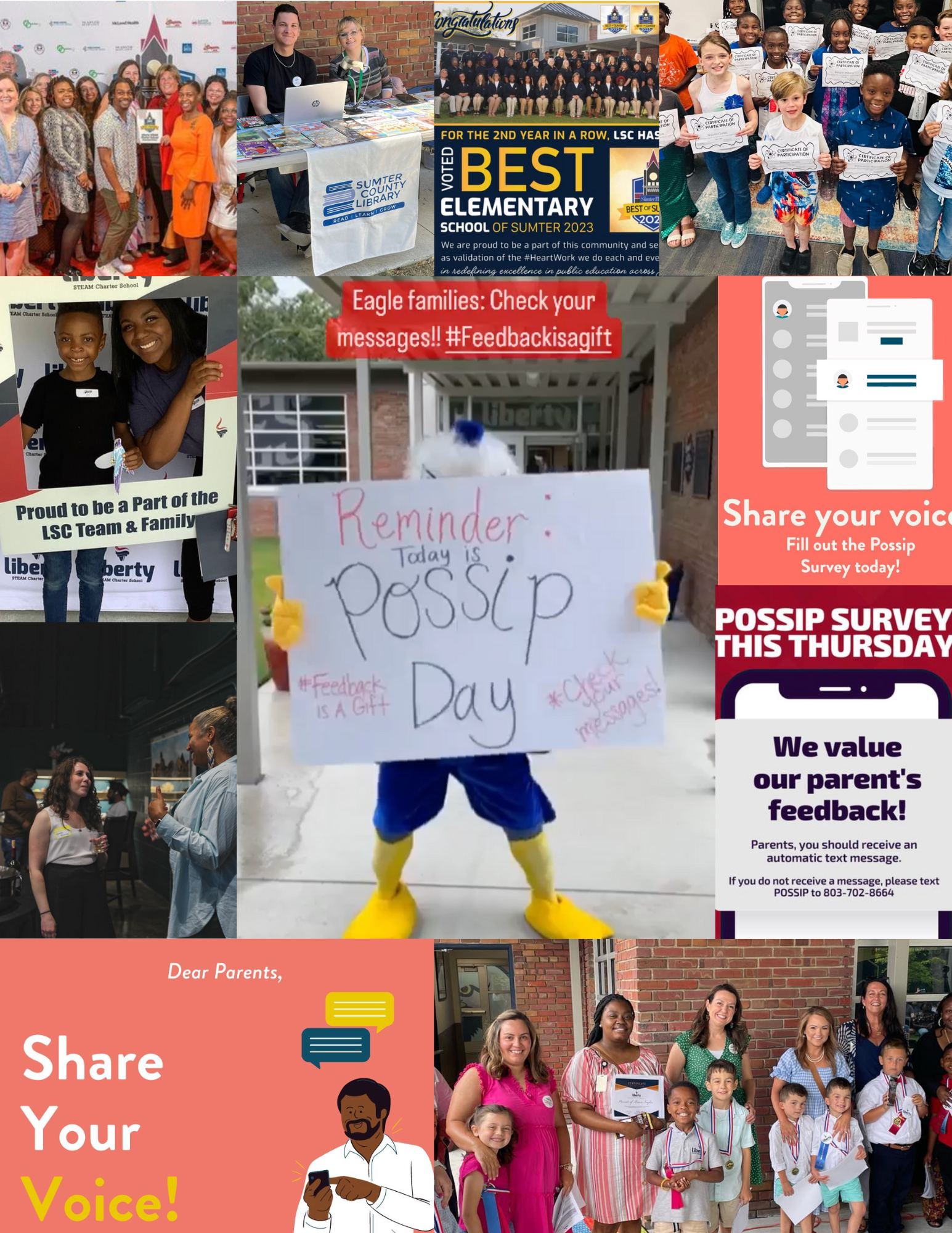
Liberty Steam Charter Opens and Closes and the Feedback Loop
How can you say no with the eagle requests community feedback? Liberty Steam’s mascot gets into the spirit and reminds families to look for their Pulse Check from Possip! See it in action here!
They also close the feedback loop by sharing how parent responses have inspired new programs! “Originally learning of this need from our Possip feedback surveys, we continue to be grateful for our partnership with the Sumter County Library in bringing the bookmobile experience to our scholars!”. See the post here.
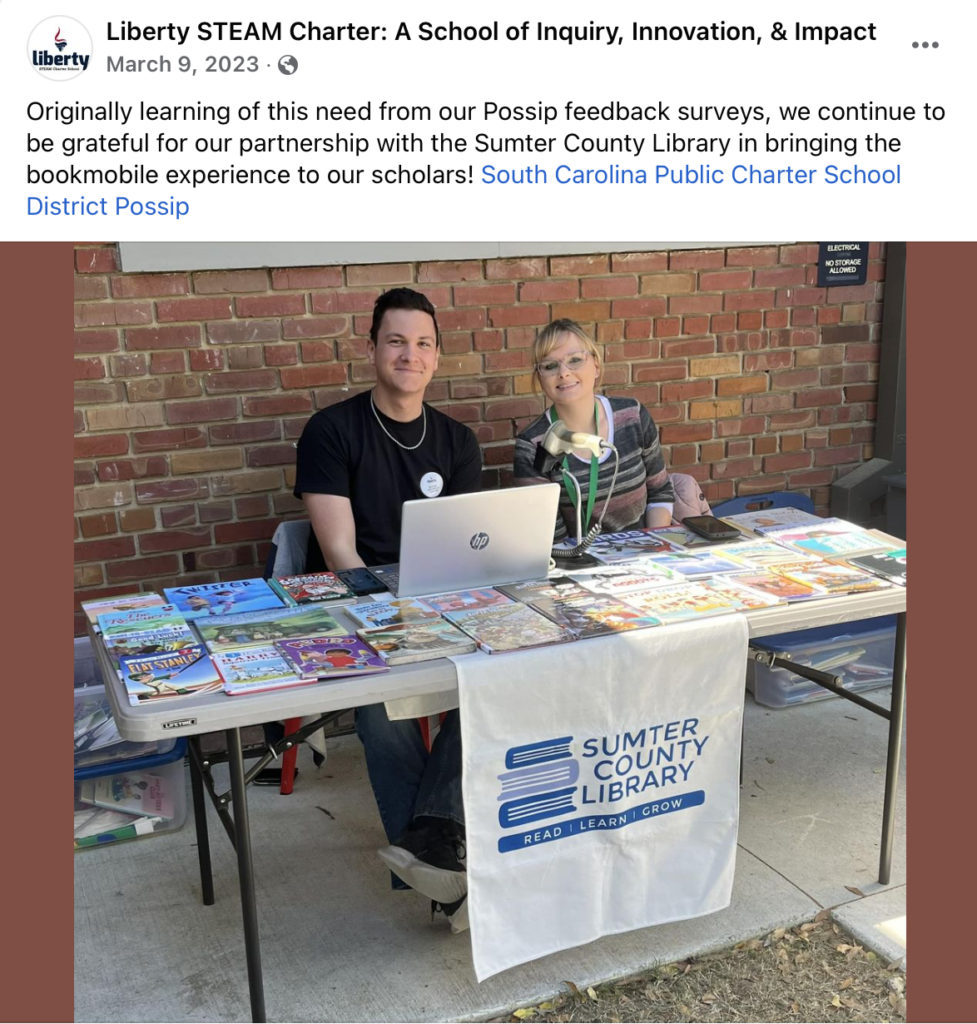
KIPP Nashville Explains What to Expect When They Request Community Feedback
“Your voice matters! We need to hear what’s working for you and what you need. This year we will send routine text messages and emails with a few simple questions asking for feedback on your experience with school. You will receive these messages from Possip, an organization we have partnered with to learn your needs. Look for the first pulse check this week. We look forward to hearing your thoughts and feedback!
“¡Tu voz importa! Necesitamos escuchar lo que funciona para usted y lo que necesita. Este año enviaremos mensajes de texto y correos electrónicos de rutina con algunas preguntas sencillas solicitando comentarios sobre su experiencia en la escuela. Recibirá estos mensajes de Possip, una organización con la que nos hemos asociado para conocer sus necesidades. Busque el primer chequeo de pulso esta semana. ¡Esperamos escuchar sus pensamientos y comentarios!”
See the post live here!
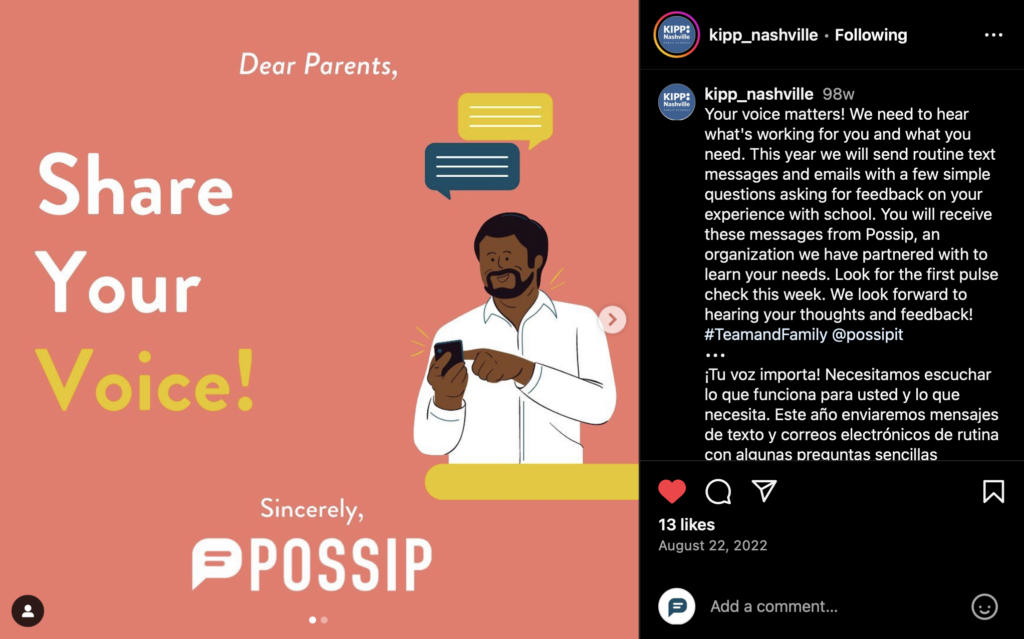
Lead Southeast High Invites Family Voices in Their Language Of Choice
“Share your voice! It’s that time of year again to share your feedback with us! We value your input and want to hear what you have to say! Please be sure to complete your Possip survey that goes out today so that we can continue improving our systems! These surveys will go out bi-weekly. If you have any trouble or do not receive one by this evening, please reach out [to us]. Have a great week!
“Comparta tu voz! ¡Es ese tiempo nuevamente para compartir sus comentarios con nosotros! Valoramos su opinión y queremos escuchar lo que usted quiere decir! Asegúrese de completar su encuesta Possip que se envíe hoy para que podamos continuar mejorando nuestros sistemas! Estas encuestas saldrán cada dos semanas. Si tiene algún problema o no recibe uno esta tarde, por favor contacte [us]. Tenga un buen dia!
شارك بصوتك! إنه ذلك الوقت من العام مرة أخرى لمشاركة ملاحظاتك معنا! نحن نقدر مداخلاتك ونريد أن نسمع ما لديك” لتقوله! يرجى التأكد من إكمال استطلاع Possip الذي يتم ارساله اليوم حتى نتمكن من مواصلة تحسين أنظمتنا! سنرسل هذه الاستطلاعات كل أسبوعين. إذا كانت لديك أي مشكلة أو لم تتلق واحدة بحلول هذا المساء ، فيرجى التواصل مع [us]. أحظى بأسبوع ممتع!”
See the post requesting community feedback live here!
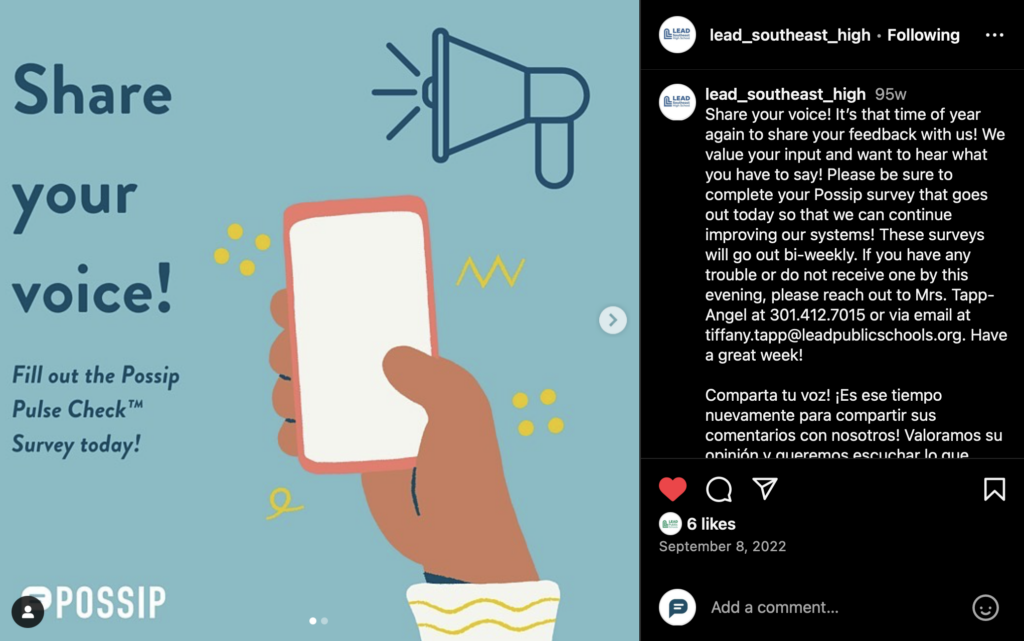
Citizens of the World LA Requests Community Feedback, Simply
“Reminder to check your email for your Possip #PulseCheck this week! Have a wonderful weekend  ” See the post here!
” See the post here!
Shout out to all of our partners who share the good and ensure their communities’ voices are heard! Thank you for creating an inclusive and responsive environment for your communities!
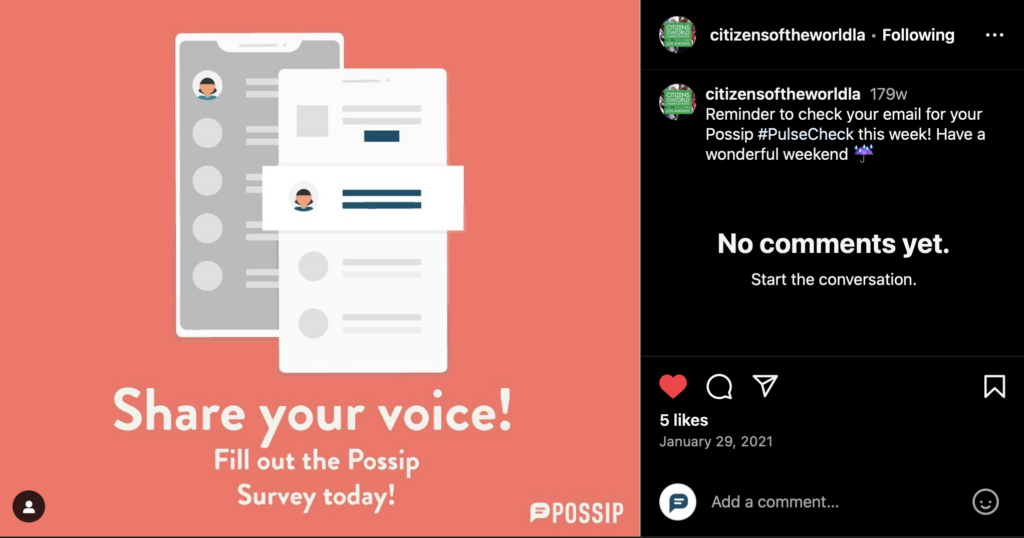
The post Voices Heard: How Possip Partners Request and Highlight Community Feedback appeared first on Possip.
Thursday, 11 July 2024
Love & Belonging In Schools
Unlock a world of exclusive content and insights for leaders who listen!
Join our community of Possip Members to get ahead of the trends, access free resources, and more!
SIGN UP NOW or sign in below.
The post Love & Belonging In Schools appeared first on Possip.
Tuesday, 9 July 2024
Attendance Checks by Possip: Addressing Chronic Absenteeism and Declining Daily Attendance Rates
Table of Contents
For parents, teachers, and school administrators alike, consistent student attendance checks enables a thriving educational environment. Kids need to be in school to learn and schools need kids to be in school to teach. Attendance drives the heartbeat of every school, reflecting not just the physical presence of students but also a measurement of their engagement and commitment to learning.
Caroline Carrello, a Possip intern majoring in Human and Organization Development at Vanderbilt University, relays how Possip can help schools and families with Attendance Checks. Thanks also to Jasmine Blue, Alyssa Collins, and our Possip Partners for contributing to this article!
Addressing absenteeism can be tricky. According to the US Department of Education, research says “chronic absenteeism may prevent children from reaching early learning milestones” (read more here). To support both schools and families, Possip offers Attendance Checks.
District Case Study: KIPP Jackson Public Schools
KIPP Jacksonville Public Schools of Florida has been a Possip Partner since 2021. In the 2023-24 school year, they began sending Attendance Checks by Possip twice a month as one of their strategies to help the district meet state requirements to show communication and outreach to families of chronically absent students. They took a tiered approach where they first contacted all students who were absent 20 or more days. School social workers or administrators connected with those families. Toward the end of the year, they moved away from the number of days absent to those students missing a certain percentage of days.
They used Attendance Checks to simultaneously 1) share the district and state goal of students being in school 95% of the time, 2) contact families with students who were not hitting that mark, and 3) toward the end of the year, they added an option for families to indicate that they needed support. So, for example, the district knew the kids who have been sick and missing days, but how could the district support the family to help get them back to school?
The strategy proved effective for KIPP Jacksonville and they will again send Attendance Checks in addition to Pulse Checks in the coming school year as one way to reach some of their most vulnerable families.
What are Attendance Checks by Possip?
Possip’s Attendance Checks offer a seamless and effective method for tracking student attendance. Possip streamlines the process for educators and families alike, utilizing SMS texts and email, making it an inclusive tool. Through automated reminders, parents can promptly respond to attendance inquiries, ensuring consistent tracking of their child’s classroom presence. Moreover, Possip introduces innovative features such as multilingual, text-based surveys, enabling schools to gather feedback from families on attendance barriers while fulfilling state and district reporting obligations.
What can schools or districts expect?
- Weekly “Attendance Checks” delivered to designated families
- Delivery via SMS text or email for convenience
- Two-way translation capabilities in over 100 languages
- Reports organized in user-friendly formats
- Affordable, all-inclusive annual pricing, with discounts available for small schools and multiple institutions.
How do Attendance Checks work?
Watch this video to see how Possip’s Attendance Check works.
School Case Study: Henry C. Maxwell Elementary
Henry C. Maxwell Elementary, located in Nashville, TN needed help with low student attendance. The Principal, Dr. Bernice Russell, recognizes that consistent attendance is paramount to student success: it enables students to achieve academic milestones. The school decided to use Possip’s Attendance Checks to improve their attendance rates. We asked Dr. Russell about the school’s experience.
According to Dr. Russell, Possip’s easily accessible Attendance Checks have helped improve the school’s struggles with chronic absenteeism and average daily attendance. Dr. Russell shared that one of the key reasons Possip Attendance Checks have been successful is because they can be sent to families in their preferred languages. Communicating with parents in their preferred language eliminates barriers and ensures improved engagement. At Henry C. Maxwell Elementary School, Possip’s support for the 11 languages families speak at home caters to the diverse needs of the school community and facilitates seamless communication between parents and the school administration.
Additionally, Dr. Russell explained that Possip’s customizable questions allow the school to gather valuable insights from parents regarding strategies that have helped improve their child’s attendance. This exchange of information helps the school plan attendance initiatives and empowers parents by providing them with practical tips shared by their peers. The school also promotes attendance through various incentives and competitions, encouraging students to prioritize regular attendance. As a result of these efforts, Maxwell Elementary is on track to meet the district attendance goals.

The post Attendance Checks by Possip: Addressing Chronic Absenteeism and Declining Daily Attendance Rates appeared first on Possip.
Friday, 5 July 2024
School Climate Survey Questions: Teachers, Staff, & Students
Speed Read (tldr) of School Climate Survey Questions: Teachers, Staff, and Students

-
Comprehensive Assessment Tool: Climate and culture surveys provide a structured way to assess school environments, including safety, engagement, and instructional effectiveness. They gather feedback from students, staff, and parents to identify strengths and areas needing improvement, crucial for fostering a positive school climate.
-
Drive Targeted Improvements: Insights from these surveys help schools implement focused improvements such as enhancing safety measures, integrating mental health support, and refining instructional practices. Engaging stakeholders promotes collaboration and supports continuous school improvement.
-
Enhance Stakeholder Satisfaction: By addressing identified areas, schools improve satisfaction among students, staff, and parents. A supportive school climate enhances academic outcomes and overall well-being, fostering a sense of belonging in the school community.
Read below for resources, tips, and the why!
Table of Contents
Climate and culture surveys are invaluable for assessing the various aspects of a school’s environment—ranging from safety and engagement to the effectiveness of instructional methods. Accordingly, schools can foster a supportive and thriving atmosphere for students, staff, and parents alike by understanding and addressing these areas. Therefore, we’ve compiled questions and these things to consider when building school climate survey questions for teachers, staff and students.
What is a school climate and culture survey?
Schools use a climate and culture survey to assess various aspects of the school’s environment and the experiences of students, staff, and parents. These surveys aim to gather perceptions and data. Afterward, school leaders can use the information collected to create a positive and supportive school climate.
Why is a school climate survey important?
School climate surveys aim to identify strengths and areas needing improvement to ensure a safe, supportive, and effective learning environment. So, schools use these insights to promote positive behavior, integrate mental health support, enhance school safety, and implement restorative practices and mindfulness techniques. Furthermore, engaging parents and community partners plays a critical role in fostering shared leadership and driving continuous school improvement. With this in mind, learn more about creating a welcoming and inclusive climate with our webinar event recaps: “A Welcoming School Climate: Creating Spaces for Safety, Inclusion, and Belonging” and “Foundations of a Strong School Climate: Operational Excellence”.
What areas are typically assessed in a school climate survey?
The National Education Center for Statistics provides examples and topics typically covered in such surveys:
Engagement
- Cultural and Linguistic Competence: Evaluates how well the school respects and integrates diverse cultural and linguistic backgrounds.
- Relationships: Assesses the quality of interactions and relationships among students, staff, and parents.
- School Participation: Measures the level of involvement and engagement of students and families in school activities.
Safety
- Emotional Safety: Gauges how safe students feel emotionally within the school environment.
- Physical Safety: Assesses the physical safety measures and the perception of safety among students and staff.
- Bullying/Cyberbullying: Examines the prevalence and handling of bullying and cyberbullying incidents.
- Substance Abuse: Investigates issues related to substance abuse within the school community.
- Emergency Readiness/Management: Evaluates the school’s preparedness and response plans for emergencies.
Environment
- Physical Environment: Looks at the quality and condition of the school’s physical facilities.
- Instructional Environment: Assesses the effectiveness and inclusiveness of the instructional practices.
- Physical Health: Evaluates the promotion and maintenance of physical health among students and staff.
- Mental Health: Investigates the support and interventions available for mental health needs.
- Discipline: Examines the fairness and effectiveness of the school’s disciplinary practices.
In the event that you would like to foster a welcoming hybrid or virtual school environment, you can adjust questions accordingly.
For Teachers & Staff
- What changes do you feel are most needed at Our School?
- Name one school practice you would like to see improve next year.
- What part of the school day is your favorite? Why?
- The updated school mission was shared last week. What about that mission and SY24-25 excites you?
- What would you like to be started, stopped, or continued to make next school year great?
- Hi from Our School! We’re closing this year strong and want your feedback. What do you most want on campus as we prepare for next year? Reply with the number of your top choice. 1) Improved school leadership communication 2) Improved facilities 3) Family involvement opportunities 4) Improved family/teacher communications 5) Stricter discipline procedures 6) Other, please explain.
- What feedback do you have for the school after the first 4 months?
- What would meet or exceed your expectations for the first 3 months of school at Our School?
- Please share what your experience was like when you were in the grade your student is in currently. How do you hope it is the same or different from your child’s experience?
- Do you think Our School has made a difference in the community? Please reply: YES or NO.
- As we prepare for our return after winter break, please reply with the number of the activity you’d most prefer: 1) A reconnection activity 2) An activity with a focus on staff health and wellness
- Do you have any student culture concerns or support needs? Please reply: YES or NO. If YES, please share.
- Have you noticed any positive improvements in school culture? Please reply: YES or NO, and explain.
Additional questions for staff regarding equity, school climate, and culture, can be found here!
Example School Climate Survey Questions Related to Safety for Students
- Hello from Our School. From your perspective, what is the single most important addition that Our School could make to improve school safety? Please reply with the number of your top choice: 1) Security guard 2) Surveillance Cameras 3) Intercom System 4) Upgraded code-entry locks
- Hi from Our School! We are considering adding security personnel for next school year. How do you feel about that? 1) Extremely comfortable 2) Comfortable 3) Neutral 4) Slightly uncomfortable 5) Very uncomfortable
- What is the most important campus security policy you would like to see at Our School next year?
- Would you be interested in participating in a Safety Committee to help us improve traffic safety at Our School? Please reply: YES or NO. If you reply YES, please ensure that you have included your contact information in this report so we can follow-up with you.
- In what ways would you like to see your child grow socially or emotionally?
- Is your child struggling with any of the following? Please reply with the number(s) that apply and share your name at the end of this survey if so. 1) Peer relationships 2) Bullying 3) Other, please explain 4) None of the above
- Social-Emotional Learning (SEL) is the process of developing the self-awareness, self-control, and interpersonal skills that are vital for school, work, and life success. Do you feel your student needs support in any of those specific areas? Please reply with the number of your top choice(s): 1) Self-awareness 2) Self-control 3) Interpersonal Skills
- Your child practices the 4 Conscious Discipline calming breathing techniques daily at school. Does your child practice these techniques at home? Please reply YES or NO. If YES, does he/she have a favorite technique?
Examples of Short School Climate Surveys
For Families
- Are you happy with Our School this year? Yes, Mostly, No
- When thinking about your student’s experience at school, how would you prioritize the importance of the following categories: (5pt scale)
- Academics
- Teachers & Staff
- Operations (Communications, Procedures, Building, Transportation)
- Community & Culture (Sense of Belonging, Personal Feelings of Safety)
- How would you rate your satisfaction with each of the following categories: (5pt scale)
- Academics
- Teachers & Staff
- Operations
- Community & Culture
- Do you feel that your student is successful at Our School? Yes, Mostly, No
- Do you feel that your student has the resources needed to succeed? Yes, Mostly, No
- Are you happy with your student’s classroom experience this year? Yes, Mostly, No
- How would you rate your satisfaction with communication at Our School? (5pt scale) *Levels can be edited to be relevant to your community* From the School, the District, the Classroom
- If you could change one thing about your experience at Our School, what would it be?
- Do you have any praise to share about Our School?
- Do you have any needs, ideas, or feedback to share?
For Staff
- Are you happy working with Our School this year? Yes, Mostly, No
- When thinking about your experience at Our School, how important are the following categories to you: (5pt scale)
- Administration
- Workload
- Operations (Communications, Procedures, Building, Policies)
- Community & Culture (Sense of Belonging, Personal Feelings of Safety)
- How would you rate your satisfaction with each of the following categories: (5pt scale)
- Administration
- Workload
- Operations (Communications, Procedures, Building, Policies)
- Community & Culture (Sense of Belonging, Personal Feelings of Safety)
- Do you feel that you are successful at Our School? Yes, Mostly, No
- Do you feel that you have the resources needed to succeed? Yes, Mostly, No
- Are you happy with your experience within your department this year? Yes, Mostly, No
- How would you rate your satisfaction with communication? (5pt scale) *Levels can be edited to be relevant to your community* From your Principal, your School District
- If you could change one thing about your experience, what would it be?
- Do you have any praise to share?
- Do you have any needs, ideas, or feedback to share?
Geared to High Schoolers
- Are you happy with Our School this year? Yes, Mostly, No
- When thinking about your experience at School, how important are the following categories to you: (5pt scale)
- Academics
- Teachers & Staff
- Operations (Communications, Procedures, Building, Transportation)
- Community & Culture (Sense of Belonging, Personal Feelings of Safety)
- How would you rate your satisfaction with each of the following categories: (5pt scale)
- Academics
- Teachers & Staff
- Operations
- Community & Culture
- Do you feel that you are successful at Our School? Yes, Mostly, No
- Do you feel that you have the resources needed to succeed? Yes, Mostly, No
- Are you happy with your classroom experience this year? Yes, Mostly, No
- How would you rate your satisfaction with communication? (5pt scale) *Levels can be edited to be relevant to your community* From your teachers, your principal, the school district
- If you could change one thing about your experience, what would it be?
- Do you have any praise to share?
- Do you have any needs, ideas, or feedback to share?
Conclusion
Understanding your school’s climate through surveys is crucial, but truly acting on that understanding is what brings about meaningful change. By scheduling a demo with Possip, you can see firsthand what your community is really saying. Discover how our tools can help you gather and analyze this essential feedback to improve your school’s environment and foster a positive and inclusive atmosphere for everyone involved. Schedule your Possip demo today and start making informed decisions that reflect the true needs and wishes of your school community.

school climate survey questions
The post School Climate Survey Questions: Teachers, Staff, & Students appeared first on Possip.